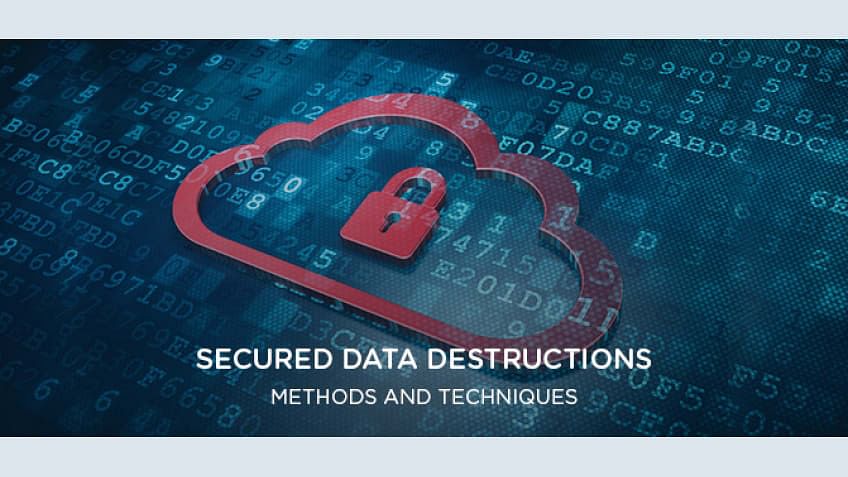The Relevance of Effective Data Destruction Practices in Safeguarding Sensitive Info and Ensuring Computer Safety And Security
In an age where data breaches are increasingly common, the importance of effective data destruction techniques can not be overemphasized. Applying robust information devastation techniques not only reduces these dangers yet additionally straightens with lawful conformity needs, ensuring that organizations maintain their track record and foster customer depend on.
Comprehending Data Destruction
Understanding information devastation is vital in today's digital landscape, where sensitive information can conveniently be compromised. Reliable data devastation entails not merely ensuring however removing data that information is irretrievable through detailed methods. This process is essential for organizations that take care of private customer information, copyright, or inner files, as any type of breach can cause extreme financial and reputational repercussions.
Information destruction encompasses different strategies, consisting of shredding physical media, degaussing magnetic storage devices, and utilizing software-based options that overwrite information multiple times. Each method serves a certain objective and must align with the sensitivity of the info being disposed of. Physical destruction is typically liked for difficult drives having very personal information, while software program methods may suffice for less delicate details.
Moreover, sticking to sector criteria and guidelines, such as the General Data Security Policy (GDPR) or the Medical Insurance Transportability and Liability Act (HIPAA), is necessary for compliance and to reduce legal threats. Organizations must establish a durable information devastation plan, train workers on finest practices, and regularly audit their treatments to ensure that all delicate info is dealt with securely and efficiently.
Risks of Inadequate Practices
Insufficient data damage techniques reveal organizations to significant threats that can have far-reaching consequences. When delicate info is not appropriately dealt with, it stays at risk to unauthorized gain access to, which can result in data breaches and identification burglary. Such events not just jeopardize the security of individuals yet likewise stain the organization's reputation, causing a loss of consumer depend on and potential monetary effects.
Moreover, regulative conformity is increasingly stringent in several markets. Failure to comply with data devastation laws can cause substantial penalties and lawsuits versus companies. These penalties can draw away and stress monetary sources attention from core organization procedures.
In enhancement, the abuse of residual information can bring about intellectual building theft or company reconnaissance, jeopardizing competitive benefits (data destruction). The influence of insufficient data destruction prolongs past immediate financial losses; it can also lead to long-term damages to brand name stability and market placement

Organizations should acknowledge that data security is not solely regarding preventing breaches; it likewise incorporates the responsible monitoring of data throughout its lifecycle. Disregarding efficient data devastation procedures can have catastrophic effects, highlighting the need for durable steps to alleviate these dangers.
Finest Practices for Information Destruction
Implementing effective information damage methods is crucial for protecting sensitive info and keeping conformity with governing standards. Organizations needs to adopt a multi-faceted approach to make sure that data is irretrievable, thereby preventing unapproved check my blog accessibility and potential breaches.
First, information ought to be classified based upon level of sensitivity, allowing organizations to use proper destruction approaches tailored to the degree of danger. For digital data, making use of software-based data-wiping devices that adhere to sector criteria can properly overwrite existing information. Physical destruction approaches, such as shredding or degaussing, are important for gadgets that keep sensitive information, ensuring full removal.
Developing a clear data retention plan is crucial, outlining for how long different kinds of information must be retained prior to damage. Normal audits of data storage space systems are also essential to recognize outdated or unneeded information needing elimination.
Additionally, training staff members on the significance of information destruction and the certain methods to comply with fosters a society of safety within the company. Finally, keeping documentation of data devastation refines provides responsibility and sustains conformity with external policies and interior plans. By sticking to these best methods, organizations can dramatically reduce the threats related to data direct exposure.
Legal and Conformity Considerations
Failure to conform with these regulations can lead to severe charges, including significant fines and reputational damages. Organizations must execute a durable information destruction plan that straightens with these legal frameworks and supplies clear guidelines on the appropriate techniques of information disposal, whether physical shredding or digital wiping.
In addition, preserving documents of data damage tasks is vital for showing compliance throughout audits or examinations. By prioritizing legal and compliance considerations, companies can boost their information security position and foster depend on with stakeholders and customers, inevitably adding to a more secure data management atmosphere.
Benefits of Effective Data Destruction
Efficient data destruction methods prolong past simple compliance; they provide considerable advantages to organizations that prioritize them. By guaranteeing that sensitive information is irretrievably destroyed, recommended you read organizations mitigate the risk of information violations and the possible economic effects connected with them. This positive approach not just safeguards versus unauthorized access yet additionally boosts the general dependability of the organization in the eyes of stakeholders and clients.
Implementing durable information damage techniques, such as physical destruction of storage space gadgets or sophisticated data cleaning strategies, adds to the conditioning of an organization's cybersecurity posture. data destruction. It lowers the chance of copyright burglary and secures proprietary information, thus maintaining an one-upmanship on the market

Final Thought
In verdict, efficient data destruction techniques are necessary for guarding delicate info and enhancing overall computer system protection. Eventually, a commitment to durable information damage strategies cultivates a culture of responsibility, therefore reinforcing an organization's cybersecurity posture and keeping customer count on.
